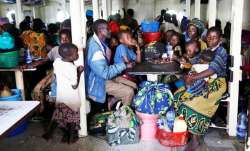50 dead in suspected cholera outbreak in Nigeria
The outbreak in Nigeria has remained persistent, occurring annually mostly during the rainy season and more often in areas with poor sanitation, overcrowding, lack of clean food and water, and areas where open defecation is common practice.

At least 50 people have been killed in a suspected cholera outbreak this year in Nigeria, local health authorities confirmed. Some eight states across the country had reported the suspected cholera outbreak, Xinhua news agency quoted the Nigeria Center for Disease Control (NCDC), which is currently monitoring the situation and coordinating the national response, as saying on Tuesday.
"As of March 28, a total of 1,746 suspected cases including 50 deaths with a case fatality rate that is 2.9 per cent have been reported," Chikwe Ihekweazu, head of the NCDC, told reporters in Abuja.
The states of Nasarawa, Sokoto, Kogi, Bayelsa, Gombe, Zamfara, Delta and Benue have reported the suspected cholera cases, Ihekweazu said.
Cholera is a highly virulent disease characterized in its most severe form by a sudden onset of acute watery diarrhea that can lead to death.
The outbreak in Nigeria has remained persistent, occurring annually mostly during the rainy season and more often in areas with poor sanitation, overcrowding, lack of clean food and water, and areas where open defecation is common practice.
On November 20, 2019, Nigerian President Muhammadu Buhari signed an executive order committed to ending open defecation throughout the country by 2025 in consonance with the commitment to the UN Sustainable Development Goals.
Whilst signing the document, Buhari also declared a state of emergency on Nigeria's water supply, sanitation and hygiene sector, saying the action will reduce the high prevalence of water-borne diseases which caused preventable deaths in different parts of the country.
In 2018 alone, the NCDC confirmed more than 16,000 cholera-related cases across the country.
